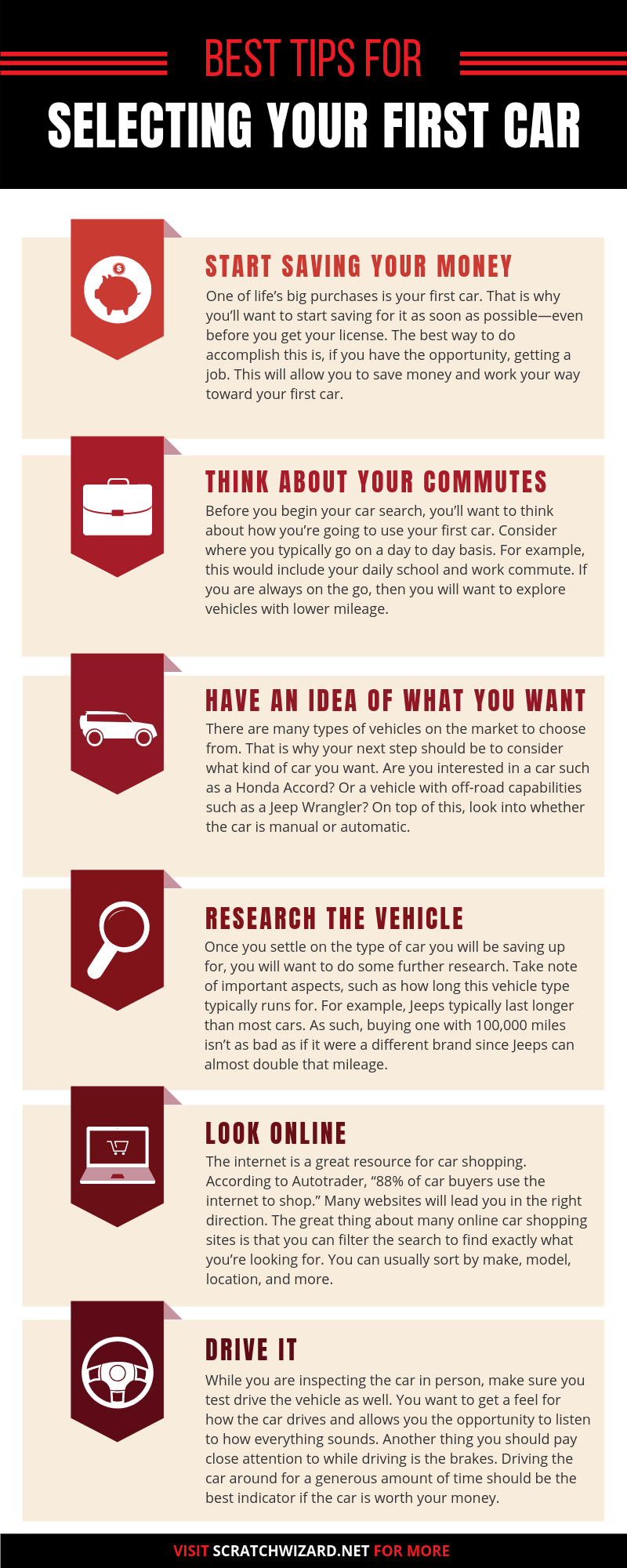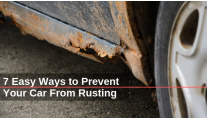
If you don’t properly prepare, purchasing your first car will prove to be a challenging process. A car is an expensive purchase. As such, it’s imperative that you do some research and shopping around before settling on a vehicle. If you are in this situation, here are some great tips for selecting your first car.
Start Saving Your Money
One of life’s big purchases is your first car. That is why you’ll want to start saving for it as soon as possible—even before you get your license. The best way to do accomplish this is, if you have the opportunity, getting a job. This will allow you to save money and work your way toward your first car. While parents may help their kids buy their first car, the best way to learn the real responsibility of owning a vehicle is to save up and pay for it yourself.
Think About Your Commutes
Before you begin your car search, you’ll want to think about how you’re going to use your first car. Consider where you typically go on a day to day basis. For example, this would include your daily school and work commute. If you are always on the go, then you will want to explore vehicles with lower mileage. Additionally, you’ll want to think about the weather in your area. If you live in a place where the winters can be rough, choosing a car with four-wheel drive might be a necessary feature. Once you determine how you will use your car, the search becomes a little bit clearer.
Buy Used
Since it’s your first, you probably are not going to buy the nicest car on the market. This is in large part due to what you will be able to afford. Plus, when you buy used, you don’t have to commit to monthly car payments. Given the make and model, you will probably want to aim for a car no older than the early 2000s. Further, to expand on our tip about saving money, when it comes to purchasing a used car, you should probably aim to save around $5,000.
Have an Idea of What You Want
There are many types of vehicles on the market to choose from. That is why your next step should be to consider what kind of car you want. Are you interested in a car such as a Honda Accord? Or a vehicle with off-road capabilities such as a Jeep Wrangler? On top of this, look into whether the car is manual or automatic. Manual is typically cheaper than automatic, so it might be worth learning how to drive stick shift to get the car you desire at an adorable price.
Research the Vehicle
Once you settle on the type of car you will be saving up for, you will want to do some further research. Take note of important aspects, such as how long this vehicle type typically runs for. For example, Jeeps typically last longer than most cars. As such, buying one with 100,000 miles isn’t as bad as if it were a different brand since Jeeps can almost double that mileage. Furthermore, look into the car’s history. Check any available records to see how well the previous owner treated the vehicle.
Look Online
The internet is a great resource for car shopping. According to Autotrader, “88% of car buyers use the internet to shop.” Many websites will lead you in the right direction. The great thing about many online car shopping sites is that you can filter the search to find exactly what you’re looking for. You can usually sort by make, model, location, and more. Most online car shops offer specifications and images so you can get a good idea on whether the car is worth pursuing.
See It in Person
After you finish scouring the internet, you’ll want to see the car in person before you make any final decisions. Checking out a car up close may reveal problems—the vehicle could appear drastically different from what it looked like online. At this time, you may also find damaged parts, and because of this, the car doesn’t work properly. Additionally, if the car is dirty in person and the interior presents a bad smell, you’ll have dodged a bullet by not buying it unseen. You will want to take an in-depth look at the vehicle and make sure it has everything you desire.
Drive It
While you are inspecting the car in person, make sure you test drive the vehicle as well. You want to get a feel for how the car drives and allows you the opportunity to listen to how everything sounds. Another thing you should pay close attention to while driving is the brakes. Driving the car around for a generous amount of time should be the best indicator if the car is worth your money.
Check Out Insurance Rates
Once you decide to purchase a car, you will need to get insurance for it. As such, take some time to shop around and look for good insurance rates and deals. There are many discounts available that car owners are unaware of. This includes student discounts for good grades, accident-free savings, and more. Plus, if you choose a used car, chances are your insurance rates will be much cheaper than if the vehicle were brand new.
Bring Someone with You to Negotiate
Since this is your first car, chances are you’ve never negotiated car prices with someone. You don’t want the seller to rip you off, so bring your parents or someone who has experience in the field to help you get a good deal. While you are negotiating, consider paying in cash, as this can often bring the cost down. In addition, calculate how much any necessary repairs may cost you. For instance, you might need to fix some scratches on the vehicle’s body; include the price of supplies needed or fees for an autobody shop to make these repairs.
These tips for selecting your first car should hopefully help you choose a safe and reliable vehicle that will keep you on the road for years to come. If your first car requires a few touch-ups, don’t fret. Scratch Wizard carries all the necessary repair products—from Honda Accord touch up paint to detailing supplies for Jeeps. Use our Shop By Your Vehicle feature to find the proper equipment for taking care of your new investment.




